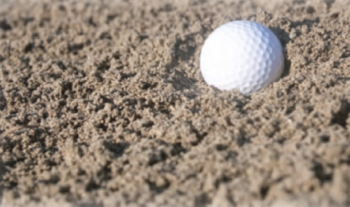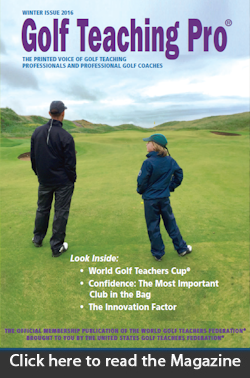Mistakes Happen…Here’s How To Make Sense of Them
 The following information can be helpful for you as a coach, and also very helpful for the golfers you coach. I do find that it’s important for coaches to practice being okay with mistakes before they can apply it to their coaching.
The following information can be helpful for you as a coach, and also very helpful for the golfers you coach. I do find that it’s important for coaches to practice being okay with mistakes before they can apply it to their coaching.
Have you felt those feelings of regret that come along with making a mistake? It’s common to feel a sense of frustration and anger after making a mistake, particularly in a sport like golf, where you are responsible for every shot and there is no one else to blame. For example, if your first tee shot doesn’t go well, you’ve made a mistake, it’s your fault, and you will usually respond in a negative way.
Whether you’re an amateur or a pro, on your best day you could still make mistakes during a tournament: slice, hook, hit into the sand, miss a putt for birdie, etc. Given this, it’s essential that you learn to deal with mistakes positively. Otherwise, you will always end up with those feelings of regret called should-have’s, which potentially lead to anxiety, loss of confidence, nervousness, and many more missed shots. In a tournament, it’s easy to see a golfer who reaches his or her tolerance level for mistakes and begin to mentally break down, because you see them throw golf clubs, use foul language, and it shows in their body language.
A mistake happens, and golfers immediately start to think about what they should have done, rather than what they did. How do should-have’s play out on the course?
- In the first scenario, a golfer hits a bad shot and will think, “Why did I do that? How could I have been so stupid on that shot? How could I make such a bad shot and why do I even bother playing? I am terrible.” For a golfer who can’t let go of having made a mistake (this is most golfers), anxiety follows, and generally the golfer will continue to spiral out of control and is unable to regain it. In this scenario, accompanying the negative thoughts are increased muscle tension and a rapid heart rate. All of these things make it hard for the golfer to think efficiently or hit the ball well.
- In the second scenario, a golfer will hold onto their mistakes for awhile (longer than necessary), but not for an extended period of time, and will be able to find their way back into the tournament. They may have already done some damage by lingering on what’s already happened, but they will have the ability to play out the rest of the round in a competitive manner.
- In the third scenario, a golfer will recognize that they’ve made a mistake, have mental tools to be able to let go of the mistake, and refocus their energy immediately back to the golf tournament.
Although the second scenario is fine, why even linger on the possibility of what you should have done when you can’t go back in that moment and change it? The third scenario is the optimal mental state for a golfer to be in after making a mistake (easier said than done). This is where they have the most control and a true ability to keep playing.
How do you get to the third scenario? There are several ways to recognize a mistake and set it aside and move on, but deciding which to use takes evaluation and development of an individualized mental plan. For example, some golfers may
recognize the mistake, take a deep breath, and use a cue word to refocus their energy into the tournament. Others use routines which are very helpful for recovering from mistakes.
My three-step system for beating your golf demons includes a pre-performance routine, preshot routine, and a way to refocus between shots. Why? Because these are the areas of the game where demons have the greatest opportunity to step in and sabotage your game. These routines are the most helpful tools to keep the should-have’s and whatif’s out of a game of golf. They are also helpful in bringing focus back to the current moment and the task at hand: lowering your handicap and winning the tournament.
Mistakes are positive. They provide feedback to your brain, specifically the part of your brain that controls motor coordination (how you hit your shots). When you hit a shot and miss the target, your brain tries to understand what went wrong and then attempts to make immediate corrections. With so many variables to consider, your brain may not be able to make sense of it all after the first, second, or even tenth attempt. Fortunately, every time you make a mistake, your brain factors in new information, processes it, and sends it to your muscles. Your brain needs you to make mistakes so that you can learn and improve. Mistakes give you important information and knowledge. Knowledge is power. However, you don’t want to work on mistakes during a tournament. Read on.
When you’re learning a new shot or finetuning an old shot, the brain needs a wealth of information to figure out what constitutes a successful stroke. What’s important to understand is that this information gathering needs to happen during practice or at the end of a round, not during a tournament. Practice is the time to practice and make changes; tournaments are not. Why? Here’s what tends to happen if you try to make changes during a tournament:
- “I just need to close my clubface a little bit more…that was too much and now I’ve hooked the ball. Next time, I’ll open it up a little more…” The thinking goes on and on and on until your brain is so confused about what it should be doing that it can’t do anything.
- And, as your brain is in the process of thinking about where your clubface should be, it starts to convince itself that it should and could be doing better than what you are capable of.
- Now your ego kicks in, and there’s little chance to dig yourself out of all this (mistaken) thinking.
Instead, a tournament is the place where you turn your brain off and let your swing happen naturally. Sure, the new stuff you are learning might not be fully reinforced; so what? You still have a great swing, but by thinking about it during a tournament you are not allowing your muscle memory to do its job.
Studies suggest that people who get angry over mistakes take longer to learn than people who are patient with themselves. The reason is while the first person is wasting time and energy with anger and negativity, the second person is learning from mistakes and moving on. The next time you make a mistake, try not to be angry with yourself. Instead, try taking a deep breath to refocus your energy on the task at hand. If you feel yourself getting angry again, take another deep breath.
A good predictor of success is a golfer’s persistence and drive. Persistent players are motivated by mistakes. For example, the more mistakes they make in executing a difficult shot, the more driven they are to master it, so they keep trying until they get it right. You should try having a similar attitude, particularly knowing how important mistakes are for gaining information, knowledge, and improvement.




